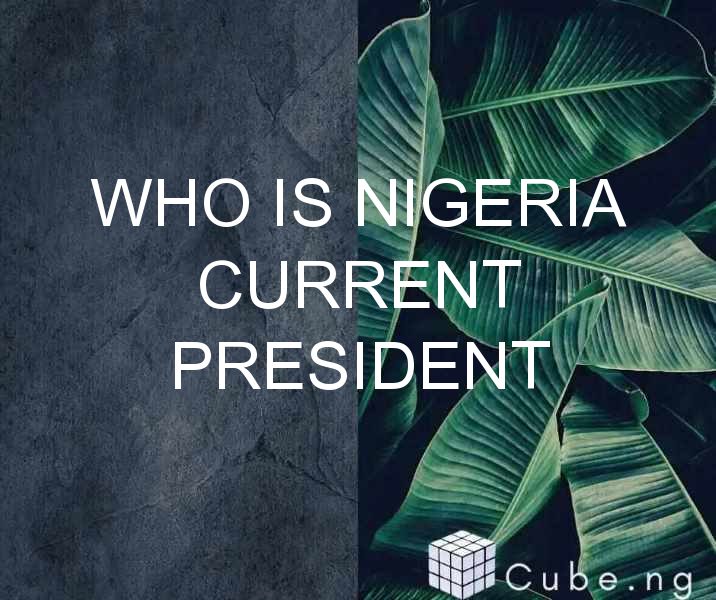Table of Contents
- Who Is Nigeria's Current President: A Comprehensive Overview
Who Is Nigeria's Current President: A Comprehensive Overview
As the most populous country in Africa, Nigeria has always been a country of great importance, both regionally and globally. In recent years, Nigeria has been at the center of various political and economic controversies, drawing the attention of the world to this West African nation. One question that often pops up when discussing Nigeria's political landscape is "who is Nigeria's current president?" In this article, we will take a comprehensive look at Nigeria's current president, his background, political career, and achievements.
Introduction to Nigeria's Political System
Before delving into who Nigeria's current president is, it is essential to give a brief overview of the country's political system. Nigeria operates a federal presidential representative democratic republic, whereby the president is both the head of state and head of government. The president is elected for a four-year term and can only serve for a maximum of two terms.
Overview of Nigeria's Political Landscape
Nigeria's political history is rich and complex. Since gaining independence from British colonial rule in 1960, Nigeria has gone through various stages of political and economic development. Nigeria has had four republics since gaining independence, with each having its peculiarities, challenges, and achievements.
Background of Nigeria's Current President
Muhammadu Buhari, Nigeria's current president, was born on December 17th, 1942, in Daura, Katsina State. He attended primary school in Daura and Mai'adua, and later moved to Katsina, where he attended Katsina Provincial Secondary School. After finishing high school, Buhari joined the Nigerian Military Training College in 1961, where he received military training. He later attended various military schools both in Nigeria and abroad, including the Army Mechanical Transport School in Borden, United Kingdom, and the Defence Services Staff College in Wellington, India.
Political Career of Muhammadu Buhari
Muhammadu Buhari's political career spans several decades. He joined the Nigerian Army in 1962, and after several years of service, he was appointed military governor of the now-defunct North-Eastern State in 1975. He was later appointed as the Federal Commissioner for Petroleum and Natural Resources by General Olusegun Obasanjo's military government in 1976.
In December 1983, Buhari led a military coup that overthrew the democratically elected government of President Shehu Shagari. Buhari became Nigeria's military head of state, and during his tenure, he implemented various policies aimed at curbing corruption, indiscipline, and improving the country's economic stability. His tenure was characterized by strict disciplinary measures, which earned him the nickname "Baba go slow."
In 1985, Buhari was overthrown in a military coup led by General Ibrahim Babangida. After his ousting, he went into political exile and returned to Nigeria in 1998 after the death of General Sani Abacha. He joined politics in 2003 and ran unsuccessfully for the presidency under the All Nigeria Peoples Party (ANPP). He also contested in the 2007 and 2011 presidential elections under the same party but lost on both occasions.
In 2015, Buhari contested for the presidency under the All Progressives Congress (APC) and won, defeating the incumbent president, Goodluck Jonathan. He was reelected for a second term in 2019, defeating his closest rival, Atiku Abubakar, of the Peoples Democratic Party (PDP).
Achievements of Muhammadu Buhari
Since assuming office in 2015, Muhammadu Buhari has implemented various policies and initiatives aimed at improving Nigeria's economy, security, and social welfare. Some of his achievements include:
Economic Reforms:
Buhari's administration has implemented various economic policies aimed at diversifying Nigeria's economy and reducing the country's reliance on oil revenue. Some of these policies include the Anchor Borrowers' Program, which provides loans to smallholder farmers, and the Presidential Enabling Business Environment Council (PEBEC), which aims to improve the ease of doing business in Nigeria.
Anti-Corruption Campaign:
Buhari has made several efforts to curb corruption in Nigeria. In 2016, his administration launched the Treasury Single Account (TSA) policy, which aims to consolidate all government revenues into a single account. He also established the Economic and Financial Crimes Commission (EFCC), which investigates and prosecutes cases of financial crimes in Nigeria.
Social Intervention Programs:
Buhari's administration has implemented various social intervention programs aimed at alleviating poverty and empowering Nigerian youths. Some of these programs include the National Social Investment Program (NSIP), which provides financial assistance to vulnerable Nigerians, and the N-Power program, which empowers Nigerian youths by providing them with skill acquisition training and job opportunities.
Challenges Facing Nigeria's Current President
Despite the achievements of Buhari's administration, there are still several challenges facing Nigeria's current president. Some of these challenges include:
Insecurity:
Nigeria is facing various security challenges, including insurgency, herdsmen attacks, and banditry. Buhari's administration has been criticized for its handling of these security challenges, with many Nigerians calling for a more proactive approach to tackle the security issues.
Economic Recession:
Nigeria's economy has been hit by recession twice since Buhari assumed office. The first recession was in 2016, and the second one was in 2020, triggered by the COVID-19 pandemic. The country's economy is heavily reliant on oil revenue, and the decline in oil prices has had a significant impact on the economy.
Unemployment:
Nigeria's unemployment rate is currently at an all-time high, with over 27% of the country's population unemployed. The high rate of unemployment has contributed to rising insecurity and social unrest in the country.
Final Thoughts
In conclusion, Nigeria's current president, Muhammadu Buhari, has had a long and eventful political career. His administration has implemented various policies aimed at improving Nigeria's economy, security, and social welfare. However, there are still several challenges facing his administration, including insecurity, economic recession, and unemployment. As Nigeria looks forward to the next presidential election in 2023, it is essential to critically assess the achievements and challenges of Buhari's administration and determine the way forward for Nigeria.




